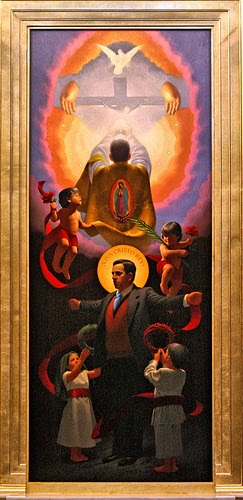 Today is the feast day of St. Peter, a saint who I greatly look up to, and whom my first son is named after.
Today is the feast day of St. Peter, a saint who I greatly look up to, and whom my first son is named after.I will talk at length about the primacy of Rome in future posts, but thought it would be a good starting point to mention how the groundwork of the Papacy was established in the Old Testament. This is a fact even many good Catholics are unaware of. I was unaware of this myself until a few years ago.
In Isaiah 22, God appoints Eliakim as prime minister to King Hezekiah (of the House of David) after the current prime minister, Sheba, dies. (This passage can also be used to prove Apostolic succession, but we will stick to the topic of the Papacy for this post). The prime minister back then was the second in command and had all the King’s authority to rule the kingdom in the King's absence until his return.
ISAIAH 22:20 And it shall come to pass in that day, that I will call my servant Eliakim the son of Hilkiah:
ISAIAH 22:21 And I will clothe him with thy robe, and strengthen him with thy girdle, and I will commit thy government into his hand: and he shall be a father to the inhabitants of Jerusalem, and to the house of Judah.
ISAIAH 22:22 And the key of the house of David will I lay upon his shoulder; so he shall open, and none shall shut; and he shall shut, and none shall open.
ISAIAH 22:23 And I will fasten him as a nail in a sure place; and he shall be for a glorious throne to his father's house.
Keys were a clear symbol of authority for the Hebrew people, as now it has become the same clear symbol for Catholics. The images mentioned in this scripture clearly elude to the Papacy. The robe of authority, will be called father (Papa, Pope), keys, throne to his Father’s house (Chair of Peter, ex cathedra).
Christ (The True King of the House of David), knowing the groundwork He laid centuries before to His people in Isaiah 22, then fulfilled the scripture by establishing a "prime minister", the Papacy, with all His power and authority to rule His Kingdom in His absence until He returns at the Second Coming:
MATTHEW 16:16 And Simon Peter answered and said, Thou art the Christ, the Son of the living God.
MATTHEW 16:17 And Jesus answered and said unto him, Blessed art thou, Simon Barjona: for flesh and blood hath not revealed [it] unto thee, but my Father which is in heaven.
MATTHEW 16:18 And I say also unto thee, That thou art Peter, and upon this rock I will build my church; and the gates of hell shall not prevail against it.
MATTHEW 16:19 And I will give unto thee the keys of the kingdom of heaven: and whatsoever thou shalt bind on earth shall be bound in heaven: and whatsoever thou shalt loose on earth shall be loosed in heaven.
It is impossible to believe that these New Testament passages are not to be defined by the Old Testament scripture and story. They are too similar to be independent of each other. Look at just one of the passages side by side:
Old Testament: "...so he shall open, and none shall shut; and he shall shut, and none shall open."
New Testament: "whatsoever thou shalt bind on earth shall be bound in heaven: and whatsoever thou shalt loose on earth shall be loosed in heaven."
St. Matthew, who wrote for Jewish-Christians, knew his Old Testament scripture well and made the obvious connection.
A second worthy point in viewing the Papacy through the Old Testament is that when God changed a person's name in the Old Testament it marked an elevation of responsibility for that person. In Genesis 17:5, God changed Abram's name to Abraham as he became the father of Israel's tribes. Christ changing Simon's name to Peter was very significant to show Peter was given the office of the Papacy at that precise moment. Many Protestants try to confuse and lessen this event by mentioning Peter's name in Matthew's gospel was recorded as "Petros" (written in Greek), meaning "pebble". This is clearly explained by the name's ending had to be aligned with the masculine form "os" of the Greek language. Ending all arguments on this diversion, was the fact that there was only one word for "rock" in Aramaic, "Kepha", the language Jesus spoke at the time he gave the Papacy to Peter.
It was Christ's absolute intent to institute the Papacy and give the office all of His authority to rule His kingdom on earth until His Second Coming! As shown, the proof of this intent dates back centuries before an impulsive, apostle fisherman spoke from his heart the God-inspired answer that defined our God, “You are the Christ, the Son of the living God.”
"Thou art Peter, and upon this rock I will build my church; and the gates of hell shall not prevail against it."
St. Peter, Holder of the Keys to the Kingdom, Pray for Us!


No comments:
Post a Comment